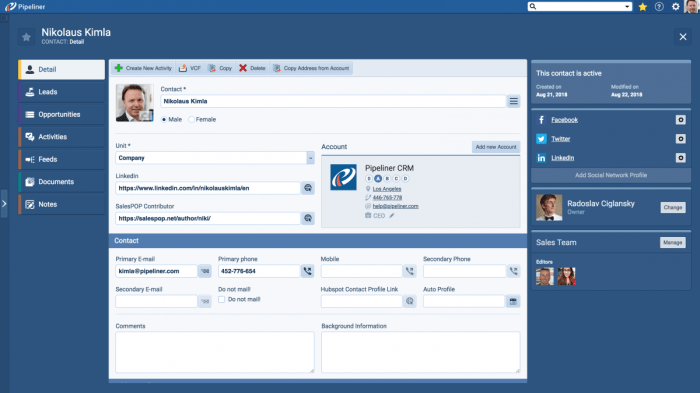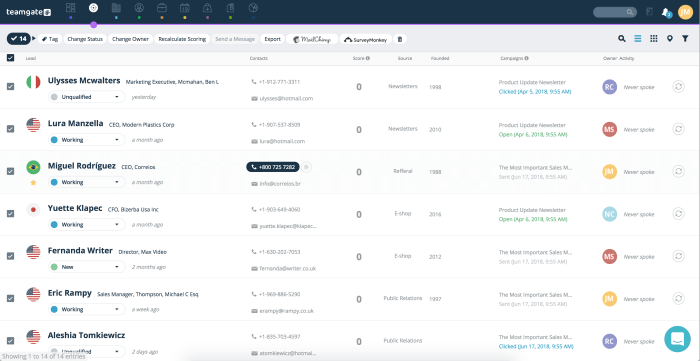Lead management sales software empowers businesses to capture, nurture, and convert leads into paying customers. It streamlines the sales process, improving efficiency and maximizing ROI. This software provides a centralized platform for managing interactions, tracking progress, and analyzing key performance indicators.
Modern sales teams are increasingly reliant on robust lead management systems to navigate the complexities of lead generation and conversion. These systems offer features that allow for targeted outreach, automated follow-ups, and personalized communication, all designed to cultivate strong customer relationships. This allows for a more comprehensive view of the sales pipeline, providing insights for effective decision-making.

Source: pipelinersales.com
Lead management sales software is a crucial tool for businesses of all sizes to streamline their sales processes and improve customer relationships. This comprehensive guide dives deep into the intricacies of lead management software, exploring its key features, benefits, and how it can propel your sales team to success.
Understanding Lead Management Software
Lead management software is a platform designed to capture, track, and nurture leads throughout the sales funnel. It automates tasks, provides insightful analytics, and facilitates effective communication between sales and marketing teams. This ultimately leads to improved conversion rates and a stronger return on investment (ROI).
Key Features of Effective Lead Management Software
- Lead Capture and Qualification: The software should seamlessly integrate with various channels (website forms, social media, email marketing) to capture leads effortlessly. Critical qualification criteria should be easily defined and implemented to prioritize high-potential leads.
- Lead Tracking and Organization: Robust tracking mechanisms are essential to monitor the progress of each lead through the sales cycle. Categorization and tagging features should enable efficient organization and prioritization.
- Automated Workflows: Automation of tasks like email sequences, follow-up reminders, and lead scoring streamlines sales operations, freeing up sales reps to focus on high-value interactions.
- Reporting and Analytics: Detailed reports and insightful dashboards provide a clear picture of sales performance, lead conversion rates, and overall campaign effectiveness. This data-driven approach is crucial for informed decision-making.
- CRM Integration: Seamless integration with Customer Relationship Management (CRM) systems ensures a holistic view of customer interactions and facilitates a smooth handoff between sales and customer service teams.
Benefits of Using Lead Management Software
Implementing lead management software yields a multitude of benefits, including:
Increased Efficiency and Productivity
Automation of repetitive tasks, like email sequences and follow-ups, frees up valuable sales time, allowing reps to focus on higher-priority activities. This boosts overall efficiency and productivity within the sales team.
Improved Lead Conversion Rates
By effectively qualifying leads and nurturing them through the sales funnel, lead management software significantly increases the likelihood of conversion. Targeted communication and personalized outreach greatly improve conversion rates.

Source: teamgate.com
Enhanced Sales Team Collaboration
Centralized lead management systems foster better communication and collaboration between sales and marketing teams. Shared insights and data improve teamwork and coordination, leading to more effective strategies.
Data-Driven Decision Making, Lead management sales software
Detailed reports and analytics provide valuable data for informed decision-making regarding sales strategies, campaign optimization, and resource allocation. This data-driven approach is crucial for sustained growth.
Choosing the Right Lead Management Software
Selecting the right lead management software requires careful consideration of your specific needs and budget. Factors to consider include:
Scalability
As your business grows, the software should be able to scale with your needs. Look for solutions that can adapt to evolving requirements and increasing lead volumes.
Integration Capabilities
The software should seamlessly integrate with existing CRM systems and marketing automation tools for a cohesive workflow.
User-Friendliness
An intuitive interface and easy-to-understand features are essential for efficient adoption and usage by your sales team.
Pricing and Support
Consider the pricing model and the level of support provided by the vendor. A competitive price point combined with robust customer support is vital.
Case Studies and Real-World Examples
Numerous businesses have successfully implemented lead management software to boost their sales performance. Exploring case studies of successful implementations can provide valuable insights and best practices.
Frequently Asked Questions (FAQ)
- Q: What is the difference between lead management and CRM software?
A: Lead management software focuses on capturing, qualifying, and nurturing leads, while CRM software manages the entire customer relationship lifecycle. Lead management is a component of a broader CRM strategy.
- Q: How much does lead management software cost?
A: Pricing varies significantly based on features, functionalities, and the number of users. It’s best to request pricing information from vendors.
- Q: How long does it take to implement lead management software?
A: Implementation timelines depend on factors like the complexity of the software, the size of your team, and the level of customization required.
Conclusion
Lead management software is a powerful tool for businesses looking to optimize their sales processes and enhance customer relationships. By implementing the right software and leveraging its features, businesses can significantly improve lead conversion rates, boost sales efficiency, and achieve sustainable growth.
Call to Action (CTA): Lead Management Sales Software
Ready to take your sales to the next level? Explore our recommended lead management software solutions today! Click here to learn more.
In conclusion, lead management sales software is a crucial tool for optimizing sales strategies and achieving sustainable growth. By leveraging the power of this software, businesses can transform their sales processes, boosting productivity and enhancing customer experiences. The strategic use of this software creates a more efficient and effective sales engine, ultimately driving revenue and success.
FAQ Guide
What are the key benefits of using lead management software?
Key benefits include improved lead qualification, automated follow-ups, increased sales productivity, and better data analysis for informed decision-making.
How does lead management software integrate with other CRM systems?
Many lead management solutions integrate seamlessly with existing CRM platforms, allowing for a unified view of customer interactions and data.
What are some of the costs associated with implementing lead management software?
Implementation costs vary depending on the chosen software, features, and the size of your business. Factors such as training, customization, and ongoing support should also be considered.
Is lead management software suitable for small businesses?
Absolutely! Many affordable and user-friendly options are available, tailored to meet the specific needs of small businesses, maximizing their investment.